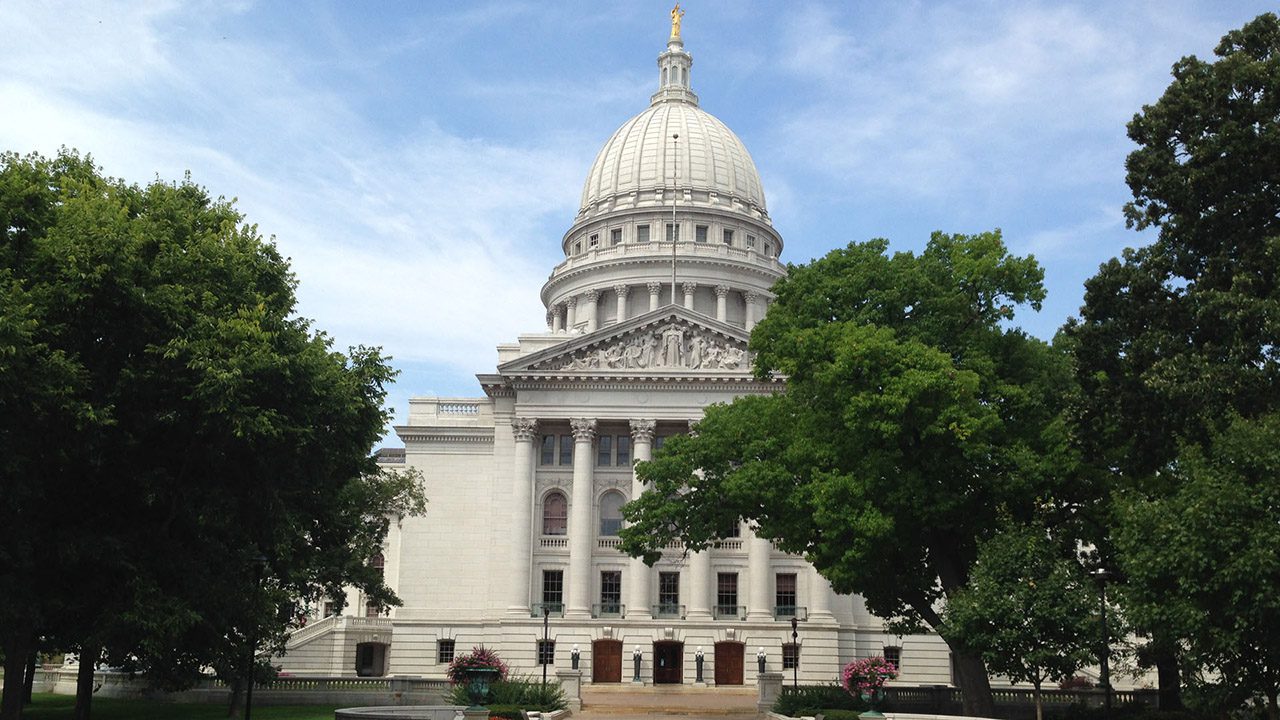Wisconsin’s Democratic governor scales back Republican tax cut, signs state budget

(Jon Ellis)
MADISON, Wis. (AP) — Wisconsin Gov. Tony Evers signed off on a two-year spending plan Wednesday after dramatically scaling back the size of a Republican income tax cut that would have moved the state closer to a flat rate.
Evers, a Democrat, called the Republican-authored budget “imperfect and incomplete” but stopped short of vetoing the entire plan, which would have required the Legislature to start over. Republicans accused him of using his veto power to enact a liberal agenda.
“There are lots of wins here,” Evers said at a signing ceremony surrounded by Democratic lawmakers, local leaders, members of his Cabinet and others.
Evers also used his partial veto power to increase funding for K-12 public schools for more than 400 years unless undone by a future Legislature and governor. The move will increase how much revenue schools can raise per student by $325 a year until 2425. Evers, a former state education secretary and teacher, said that will give schools “predictable long-term spending authority.”
Republican Assembly Speaker Robin Vos said that move would result in “massive property tax increases” because schools will have the authority to raise those taxes if state aid isn’t enough to meet the per-pupil cost. He also said scaling back the tax cut put Wisconsin at an economic disadvantage to neighboring states with lower rates.
“Legislative Republicans worked tirelessly over the last few months to block Governor Evers’ liberal tax and spending agenda,” Vos said in a statement. “Unfortunately, because of his powerful veto authority, he reinstated some of it today.”
Vos did not say if Republicans would attempt veto overrides, an effort that is almost certain to fail because they would need Democratic votes in the Assembly to get the two-thirds majority they would need.
Republicans proposed tapping nearly half of the state’s projected $7 billion budget surplus to cut income taxes across the board by $3.5 billion. Evers did away with rate reductions for the two highest brackets, resulting in a total of $175 million in tax cuts over the next two years.
Evers was unable to undo the $32 million cut to the University of Wisconsin, which was funding that Republicans said would have gone toward diversity, equity and inclusion — or DEI — programming and staff. The budget Evers signed does allow for the university to get the funding later if it can show it would go toward workforce development and not DEI.
Evers previously threatened to veto the entire budget over the UW cut. But on Wednesday, he noted that the university can recoup the cut, and he used his partial veto to protect 188 DEI positions at UW that were slated for elimination under the Republican plan.
Evers called cuts to UW funding “shortsighted, misguided and wrong for the workforce and wrong for our state.” But he also said he was confident UW would be able to work with lawmakers to get the $32 million later.
One of Evers’ vetoes removed a measure that would have prohibited Medicaid payments for gender-affirming care. The governor accused Republicans of “perpetuating hateful, discriminatory, and anti-LGBTQ policies and rhetoric” with the proposal.
The tax plan Evers signed into law cut the two lowest tax rates, paid by households earning less than $36,840 a year or individuals who make less than $27,630. Wealthier payers will also benefit from the cuts but must continue to pay higher rates on income that exceeds those limits. Republicans’ plan would have directed the largest tax cuts to the two wealthiest brackets.
Democratic state lawmakers were unified in voting against the budget. But most Democratic lawmakers stopped short of calling for Evers to veto the entire plan. Some of the ones who voted against the budget joined Evers when he signed the bill.
Evers ignored a call from 15 liberal advocacy and government watchdog groups that had urged him to “fight like hell for our collective future” and veto the entire budget, which they argued would further racial and economic inequality. Groups endorsing the letter included the League of Women Voters of Wisconsin, Voces de la Frontera, Citizen Action of Wisconsin and the Wisconsin Federation of Nurses and Health Professionals.
Evers said vetoing the entire budget would have left schools in the lurch and meant rejecting $125 million in funding to combat water pollution caused by so-called forever chemicals known as PFAS, along with turning down $525 million for affordable housing and pay raises for state workers.
No governor has vetoed the budget in its entirety since 1930. This marks the third time that Evers has signed a budget into law that was passed by a Republican-controlled Legislature. In 2019, he issued 78 partial vetoes and in 2021 he made 50. That year, Evers took credit for the income tax cut written by Republicans and used it as a key part of his successful 2022 reelection campaign.
This year he made 51 partial vetoes.
The budget also increases pay for all state employees by 6% over the next two years, with higher increases for guards at the state’s understaffed state prisons.
Harm Venhuizen is a corps member for the Associated Press/Report for America Statehouse News Initiative. Report for America is a nonprofit national service program that places journalists in local newsrooms to report on undercovered issues. Follow Harm on Twitter.
All contents © copyright 2023 Associated Press. All rights reserved